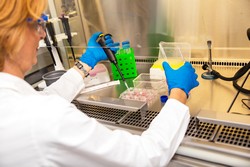Stretching proteins to the limit
The EU-funded FORCEPROT (Conformational dynamics of single molecules under force) project studied how proteins go back to their original structure after being stretched. Using a newly developed single molecule force-clamp spectroscopy technique, the researchers investigated the free energy landscape of an individual folding protein. In the first two years of FORCEPROT, the researchers established a new laboratory at King's College, London. The spectrometers housed here can achieve a force of two piconewtons, the force needed to break some key bonds in the protein. The visual resolution they achieved is at sub-nanometre level, a billionth of a metre. Completing the set-up, FORCEPROT used a molecular biology laboratory in King's College to conduct the required polyprotein DNA engineering, protein expression in bacteria and protein purification. The researchers firstly have engineered a set of topologically distinct poly-proteins that are required for the target experiments. Using a single molecule approach, they have identified a misfolded conformation involving domains swapped from two individual protein monomers. This event is likely to lead to a misfolding trajectory that results in protein aggregation. Interesting results have been achieved in exploring the effect of mechanical force on the outcome of a chemical reaction at the single bond level. Studies on the mechanochemistry of individual bonds demonstrated the surprisingly low mechanical stability of the sulphur organometallic covalent bond. Finally, project researchers extended experiments to investigate the mechanical properties of the lipid bilayers of live cells. The results demonstrated that during cell division, a particular set of lipids get up-regulated increasing the mechanical stability of the cell membrane. Applications for results of this research are relevant for many diseases that involve incorrectly folded proteins. Parkinson's disease, Alzheimer's and formation of cataracts are just some of the pathologies that stand to benefit.
Keywords
Protein folding, FORCEPROT, force-clamp spectroscopy, protein aggregation, mechanochemistry

